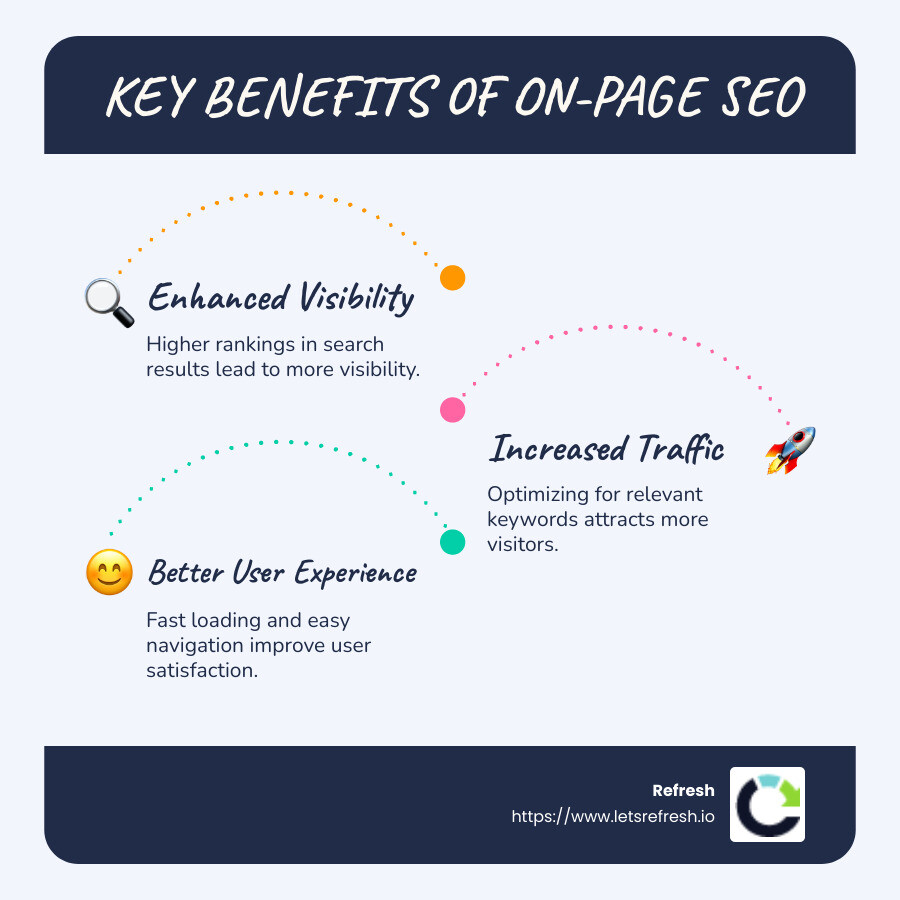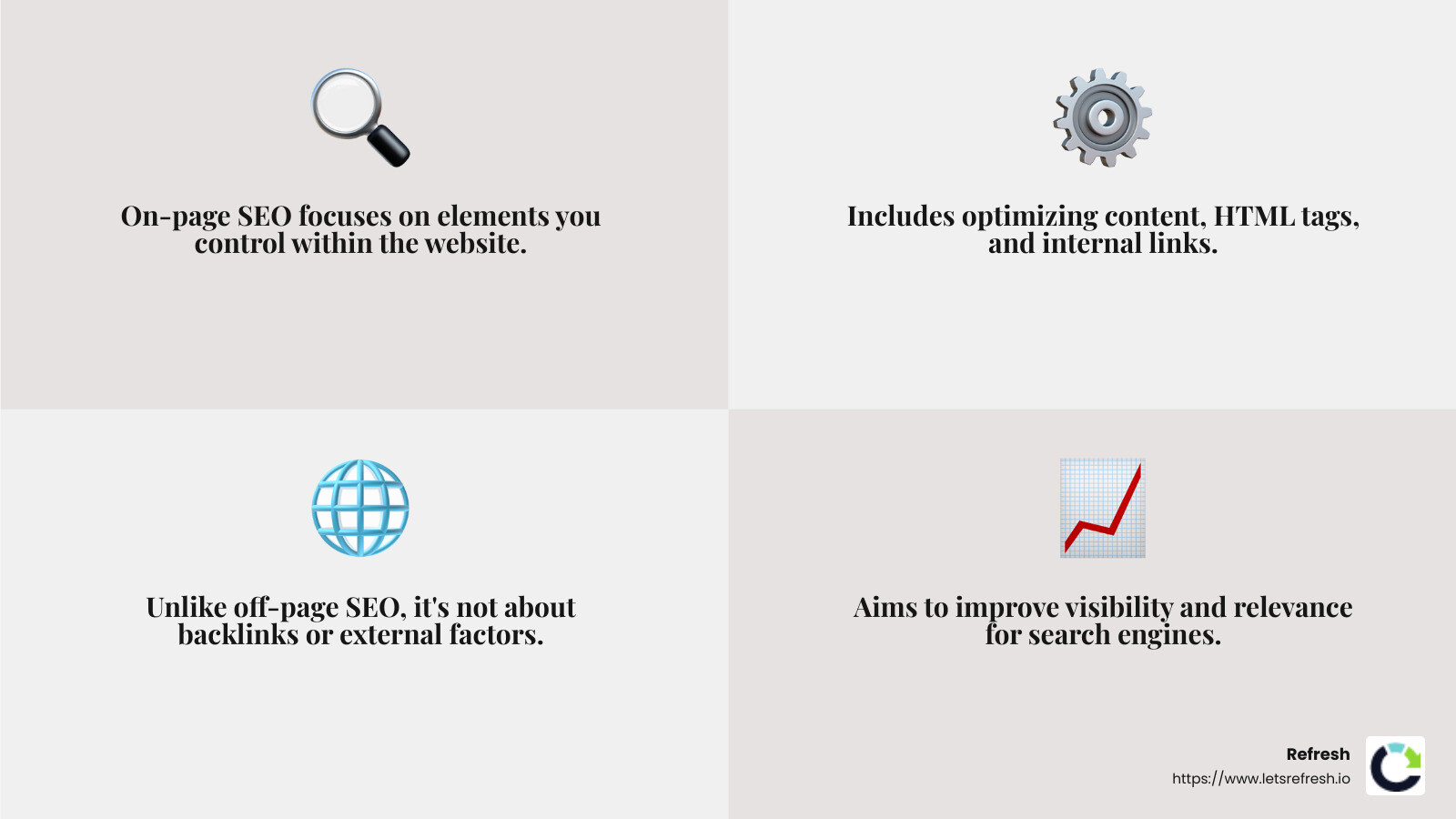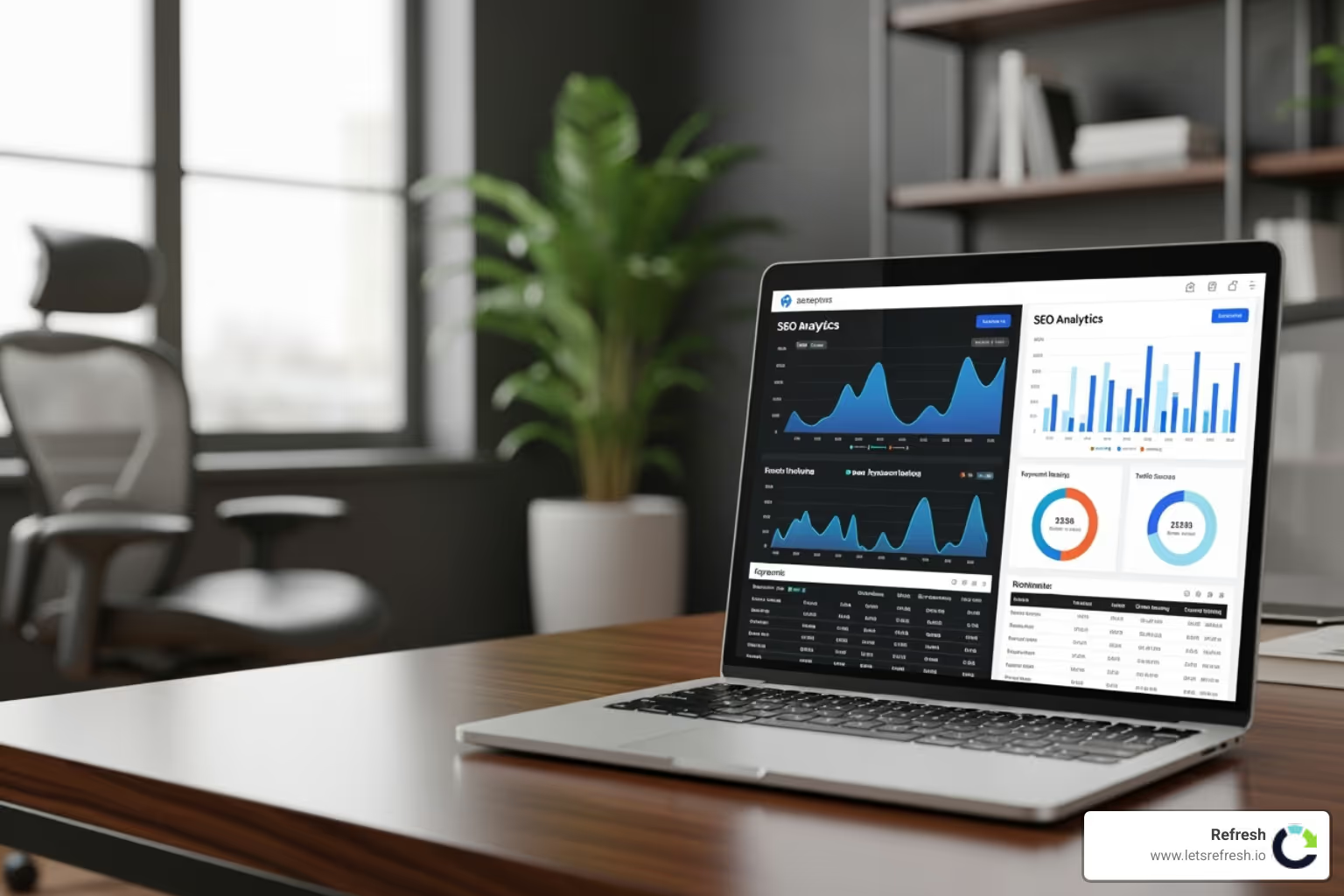On page SEO search engine optimization is crucial for enhancing your website's visibility and driving more traffic. It involves tweaking your webpages to ensure they are easy for both users and search engines to understand. Here’s a quick guide to get you started:
- Improve user experience: Ensure your site is fast, mobile-friendly, and easy to steer.
- Target relevant keywords: Use the right keywords in your titles, headings, and throughout the content.
- Optimize page elements: Include descriptive URLs, meta descriptions, and alt text for images.
These practices help your website rank higher, attract more visitors, and ultimately convert them into loyal customers.
My name is Alexander Palmiere, and as the Founder and CEO of Refresh Digital Strategy, I've helped numerous businesses thrive online through expert on page SEO search engine optimization strategies. With experience in digital marketing and a keen focus on enhancing online visibility, I'm here to guide you through optimizing your website to reach its full potential.

Handy on page seo search engine optimization terms:
Understanding On-Page SEO
When we talk about on-page SEO search engine optimization, we're diving into the art of making your website shine for both visitors and search engines. This is also known as on-site SEO. It's all about optimizing elements within your website to improve its visibility on search engines like Google.
What is On-Page SEO?
On-page SEO is the practice of tweaking individual web pages to rank higher and earn more relevant traffic. It involves optimizing parts of your website that you have control over, such as content, HTML tags, and internal links. Unlike off-page SEO, which involves external signals like backlinks, on-page SEO is all about what's happening on your site.

Why is On-Page SEO Important?
Let's break it down. Search engines like Google use bots to crawl your site and evaluate its relevance and usefulness. They look at keywords, content quality, and user experience to determine where your page should appear in search results. By focusing on on-page SEO search engine optimization, you can:
- Improve your site's visibility
- Improve user experience
- Ensure your content matches search intent
Key Elements of On-Page SEO
- Content Optimization: Create high-quality, unique content that answers your audience's questions and matches their search intent. Use tools like the Keyword Magic Tool to find relevant keywords.
- Title Tags and Meta Descriptions: These HTML elements tell search engines and users what your page is about. Write compelling title tags and meta descriptions that include your target keywords.
- Internal and External Links: Use internal links to guide users through your site and external links to reputable sources to add value to your content.
- Image Optimization: Include images with alt text that describes the image content. This helps search engines understand your images and can drive traffic from image searches.
By focusing on these elements, you can improve your site's ranking and attract more visitors. On-page SEO search engine optimization is not just about ticking boxes. It's about creating a seamless experience for your users and making it easy for search engines to understand your content.
Next, we'll dive into the Key On-Page SEO Techniques that you can implement to take your website to the next level.
Key On-Page SEO Techniques
When it comes to on-page SEO search engine optimization, mastering a few key techniques can significantly boost your website's ranking and visibility. Let’s break down these essential elements:
Content Optimization
Content is king, and optimizing it is crucial. Ensure your content is unique, informative, and custom to meet the search intent of your audience. Use tools like the Keyword Magic Tool to identify relevant keywords that can naturally fit into your content. Your content should fully answer user queries and offer something your competitors don't.
Keyword Placement
Strategic keyword placement can make a big difference. Place your target keywords in critical areas like the H1 tag, the first paragraph, and subheaders. This helps Google understand the topic of your page and ensures users can quickly determine if your content matches their needs.
Title Tags and Meta Descriptions
These HTML elements are your first impression on search engines and users. Write concise title tags (50-60 characters) that include your target keyword. Meta descriptions should be engaging and provide a brief summary of your page. Although they don't directly impact rankings, they can significantly influence click-through rates.
Internal and External Links
Internal links help users steer your site and distribute page authority. Link from high-authority pages to those that need a boost. External links to reputable sources can improve your content's credibility. Even Wikipedia uses lots of keyword-rich internal links to improve user experience and SEO.
Image Optimization
Images make your content visually appealing and can drive traffic through image searches. Use original images when possible, as they tend to rank better than stock photos. Include alt text to describe the image content, which helps search engines understand and index your images.
By applying these on-page SEO search engine optimization techniques, you can create a well-optimized site that appeals to both users and search engines. These strategies are not just about ticking boxes; they're about enhancing the overall experience and relevance of your website.
Next, we’ll explore some Advanced On-Page SEO Strategies to lift your site’s performance even further.
Advanced On-Page SEO Strategies
Once you've mastered the basics of on-page SEO search engine optimization, it's time to dive into more advanced strategies. These techniques are crucial for staying ahead in the changing SEO landscape.
Page Speed
Page speed is a critical ranking factor. Google has made it clear that fast-loading pages provide a better user experience and are rewarded with higher rankings.
To improve your page speed, consider moving to a faster host, reducing the size of your images, and minimizing third-party scripts. According to our analysis of 5.2 million websites, these changes can significantly improve load times. A slow website not only affects your rankings but also frustrates users, leading to higher bounce rates.
Featured Snippets
Featured snippets, often referred to as "position zero," are a prime opportunity to capture more visibility. These are special search results that appear above the organic listings and provide direct answers to user queries.
To optimize for featured snippets, structure your content to directly answer common questions. Use formats like paragraphs, lists, or tables. Also, keep your content clear and factual. There's no guaranteed way to secure a snippet, but aligning your content with existing snippet formats is a good start.
Schema Markup
Schema markup is a form of microdata that helps search engines understand your content better. It's the secret sauce behind rich results like recipe details or product ratings.
Implementing schema markup can improve how your content is displayed in search results, potentially increasing click-through rates. While it falls under technical SEO, its impact on on-page SEO search engine optimization is undeniable. Use Google's Structured Data Markup Helper to get started.
E-A-T (Expertise, Authoritativeness, Trustworthiness)
Google values content that demonstrates Expertise, Authoritativeness, and Trustworthiness (E-A-T). This is particularly important for websites offering advice on health, finance, or other critical areas.
To boost your E-A-T, ensure your content is well-researched and written by experts. Use credible sources and update your content regularly to maintain its relevance. Adding author bios with credentials can also improve your site's trustworthiness.
By incorporating these advanced strategies, you can improve your on-page SEO search engine optimization efforts and improve your site's visibility and credibility in search results.
Next, we’ll tackle some frequently asked questions about on-page SEO to clear up any lingering doubts.
Frequently Asked Questions about On-Page SEO
What is on-page SEO optimization?
On-page SEO optimization involves tweaking elements on your web pages to make them more appealing to search engines and users. This includes optimizing your content, HTML tags, and images to ensure they align with search engine requirements. The goal is to improve your page's visibility in search engine results.
When you optimize your content, you make sure it is relevant, high-quality, and matches the search intent of your audience. This means using keywords naturally, structuring your content with headings, and ensuring your site is easy to steer.
What is on-page SEO keyword optimization?
Keyword optimization is all about ensuring your content aligns with what people are searching for. It's about choosing the right keywords that are relevant to your content and using them strategically.
Start by conducting keyword research to find terms that your audience is searching for. Tools like Google's Keyword Planner can help you identify these terms. Once you have your keywords, incorporate them naturally into your content, including titles, headers, and meta descriptions. This helps Google understand the relevance of your page to specific search queries.
But remember, keyword stuffing (overusing keywords) can harm your rankings. Aim for a natural integration that improves readability.
What is the difference between on-page SEO and off-page SEO?
On-page SEO refers to the optimization techniques you apply directly on your website. This includes content creation, keyword placement, and internal linking. It's about controlling the elements you can directly influence to improve your site's search engine ranking.
Off-page SEO, on the other hand, involves activities outside your website to improve its authority and ranking. This includes building backlinks from reputable sites, engaging in social media marketing, and managing online reviews. Backlinks act as votes of confidence from other sites, signaling to search engines that your content is valuable.
On-page SEO focuses on optimizing your site's internal elements, while off-page SEO is about enhancing its reputation externally. Both are crucial for a comprehensive SEO strategy.
Conclusion
At Refresh, we believe that on-page SEO search engine optimization is a key part of any successful digital marketing strategy. We focus on more than just ranking your website higher in search results. Our goal is to create a user-friendly experience that keeps your audience engaged and coming back for more.
Our approach to digital marketing is holistic. We integrate SEO, branding, and social media management to build a cohesive strategy. This ensures your brand remains consistent across all platforms, which helps build trust and credibility with your audience.
We pride ourselves on forming long-term partnerships with our clients. We're not just here for quick wins; we're committed to your ongoing success. By offering expert Webflow support, we ensure your website not only looks great but also performs excellently in search rankings.
Our team at Refresh is dedicated to helping small to medium-sized businesses thrive in the digital landscape. Whether you're just starting or looking to improve your existing online presence, we're here to support you every step of the way.
Ready to boost your website's ranking and digital presence? Contact us today to see how we can help your business grow.



.avif)


